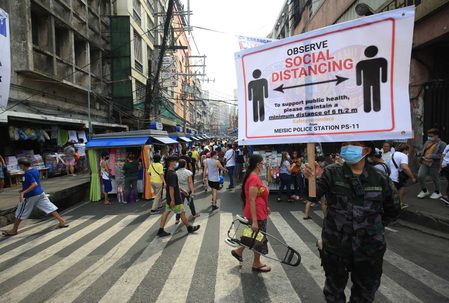SUMMARY
This is AI generated summarization, which may have errors. For context, always refer to the full article.
![[OPINION] Thoughts on COVID-19 and Misa de Gallo](https://www.rappler.com/tachyon/2020/12/Misa-de-Gallo-COVID-times-December-21-2020.jpg)
Under what seems to be the pretext of spiritual care, the Cebuano Church has allowed the celebration of Aguinaldo masses in churches under its jurisdiction. By now, prudence should have already told us that social distancing protocols are quite difficult to manage, particularly in events that invite a large gathering. Any planner worth his salt can imagine this situation even before it happens. Now, we only have to look at the pictures provided by local news outlets to taste the actual pudding of what prudence before could only warn us.
Many churchgoers crowd around outside churches. One can imagine the movement of people from and to the event, and the essential invitation of religious gatherings such as this to sing and make other interactions that are essential in the liturgy of the mass. The Catechism of the Catholic church explains that singing in mass allows the faithful to “participate in the purpose of the liturgical worlds and actions: the glory of God and the sanctification of the faithful.” These elements obviously increase the chances of viral transmission. If the planners never thought of this, then they are clearly not planning well. If they however did, then they are responsible for the consequences.
And yet despite the very precarious state that we are experiencing, that there is greater danger of a surge that can once again overwhelm our healthcare facilities at catastrophic costs, Aguinaldo masses continue.
The Church, which is relied upon to speak on matters of morality, seems to have no resolute justification for allowing Aguinaldo masses except the terse statement that it is “one of the powerful expressions of Filipino Catholic faith.” Care in this form for the spiritually thirsty does not seem to be reasonably tenable in our times, particularly in a densely populated area such as Metro Cebu. Because if holy days of obligation can be celebrated sine populo, which has already been done, why does the local church continue to allow the celebration of Aguinaldo masses in its churches today, which are not even obligatory? The laconic basis does not seem to be, at least for me, proportionate to the seriousness of the pandemic. The pithiness of this justification and the reasoning for celebrating a mañanita as a powerful and time-honored tradition among certain communities are not that different, except that one is religious, while the other is secular.
No less than the encyclical Fides et Ratio has already taught us that acting out of faith alone without reason can be dangerous. After several years studying philosophy and theology, any priest would consider the complementarity between the two wings of faith and reason, at the very least, as a guiding epistemic standard. Faith without reason leads to fanaticism — the difference can be said only to be in degree, not in kind. Goya’s aquatint reminds us, “The sleep of reason produces monsters.”
For instance, a common justification people make for physically attending Aguinaldo masses is that their faith is stronger than the disease. If sincerely considered, then the meaningfulness of this truth to the subject cannot be questioned. We can even perhaps say that for a believer the meaningfulness of this truth is overflowing. However, this subjectivity has to reckon with the objectivity of the world. No matter how much one sincerely believes in this maxim-turned-mantra does not change the fact that COVID-19 is a highly contagious disease that has taken and ruined so many lives of believers and non-believers alike, here and around the world. A superabundance of meaning that an insistent churchgoer may receive in physically attending Aguinaldo masses also turns this person into a possible vector that can affect many others, who may or may not share the same religious enthusiasm. This meaningful experience in physically attending Aguinaldo masses can transform the person, too, as an angel of death for others.
But if the sheep goes where the pastor guides them to go, then the more important question should be directed to the local church. Despite all the risks the Aguinaldo mass involves that affects not only the faithful but also the unbelievers, and despite it being non-obligatory, what exactly is the local church’s moral justification for allowing it to be celebrated with the congregation and not sine populo?
Does going to church, despite online alternatives to attend Aguinaldo mass, whether coming from an externalist (e.g., a wish that is supposed to be granted after the 9-day devotional) or internalist (i.e., in itself is the right thing to do) motives, make us better Christians? Any answer to this question is telling of the maturity of our religious consciousness as an individual and as a community, and thus, marks, too, how dangerous it can be to go to lengths for our devotions. What does the Church, particularly the local Church, teach on this matter?
These questions also lead us to government, particularly the local government unit. Why did the local government allow, and continue to allow, religious gatherings this large? To answer this, one may argue that the government is only doing its task in ensuring citizens their constitutional guarantee to exercise the freedom of expressing their religion. But if this is the case, then why are senior citizens of 65 years and above restricted from joining the religious celebration in churches? Does this not go against their constitutional right, too? Or why were there policies before that banned the gathering of large crowds which included religious events?
To these questions, I can think of, at least, 3 possible responses. First, maybe that the constitutional guarantee of freedom to religion is dependent upon IATF guidelines, such that under ECQ it is not allowed to have a large gathering even if it is a religious event, but it is now allowed in MGCQ. But, of course, this is quite absurd for obvious reasons. Second, the executive orders — presumed to be following IATF guidelines — that prohibits large gatherings which include religious events is faulty and is thereby a breach of the human rights enshrined in our Constitution. If this is the case, then should not defenders of human rights, with urgency, raise this to the courts? And yet even with the vigilance of human rights advocates, no urgency of concern seems to have been raised in this regard. Third, the all too simplistic explanation that the local government’s toleration of large religious gatherings as merely ensuring the constitutional guarantee of freedom to express one’s religion is, at the least, inconsistent. As mentioned earlier, if this is the case, then why deprive senior citizens of attending these masses? If large gatherings were prohibited before in ECQ, why not now? It seems to me that the pandemic has an interesting effect in which exceptions are becoming the rule.
In the end, one cannot help but think about an unholy alliance that blurs the distinction between the sacred and the profane. The former requiring the latter to establish itself temporally, the latter requiring the former to guarantee its legitimacy. The coinciding between the two reminds me of the words of the Italian philosopher Giorgio Agamben: “Capitalism is thus a religion in which faith – credit – is substituted for God. In other words, since the pure form of credit is money, it is a religion in which God is money.” – Rappler.com
Daryl Y. Mendoza is a faculty member of the Department of Philosophy, University of San Carlos.
Add a comment
How does this make you feel?


![[Vantage Point] My Christmas reflections: Navigating the changing tides of 2023 and moving forward](https://www.rappler.com/tachyon/2023/12/changing-tides-moving-forward-december-24-2023.jpg?resize=257%2C257&crop=399px%2C0px%2C1080px%2C1080px)

![[REFLECTIONS] A light has shone](https://www.rappler.com/tachyon/2023/12/Skepe-Nativity_Scene.jpeg?resize=257%2C257&crop=179px%2C0px%2C877px%2C877px)
![[REFLECTION] Liwanag sa dilim](https://www.rappler.com/tachyon/2023/12/Patnubay-patnubay-9.jpg?resize=257%2C257&crop=218px%2C0px%2C720px%2C720px)


![[Newsstand] The Marcoses’ three-body problem](https://www.rappler.com/tachyon/2024/04/tl-marcoses-3-body-problem.jpg?resize=257%2C257&crop=451px%2C0px%2C1080px%2C1080px)
![[Edgewise] Preface to ‘A Fortunate Country,’ a social idealist novel](https://www.rappler.com/tachyon/2024/02/a-fortunate-country-february-8-2024.jpg?resize=257%2C257&crop_strategy=attention)
![[New School] When barangays lose their purpose](https://www.rappler.com/tachyon/2024/02/new-school-barangay.jpg?resize=257%2C257&crop=414px%2C0px%2C1080px%2C1080px)
There are no comments yet. Add your comment to start the conversation.